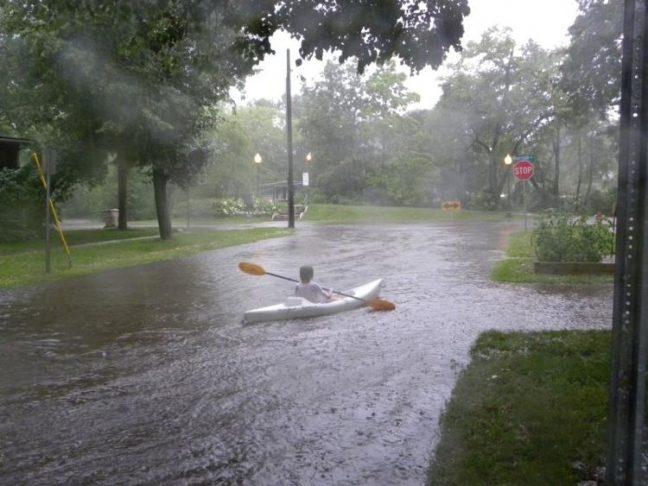For Madison — a city perilously seated between two large, slow-draining lakes — flooding has always been a given. An outside observer might question the wisdom of building a city on a narrow strip of low-lying land, a resident would simply point out the beauty of sunsets over Mendota, or the bright red trees that line the Isthmus in fall.
Despite the sunsets, the nights on the lakes and even the brilliant fall foliage, Wisconsin has found itself surrounded by a new and changing climate. Last weekend, students moving into Madison woke up ankle-deep in floodwater, watching East Johnson Street and East Mifflin Street slip further underwater as forecasts continued to call for rain.
When severe flash flooding hits, there’s often little individuals can do to mitigate disaster. In an ironic twist, months before recent storms, Wisconsin had already begun the process of decimating the few natural deterrents to flooding we had left.
Walker doesn’t care about environment, but luckily, Madison does
On Feb. 15, the Republican-controlled state assembly removed critical protections on Wisconsin wetlands, easing requirements for new development. Wetlands that, in addition to improving water quality, have functioned for centuries as reservoirs for flood water, soaking up excess rain across the state.
Supporters of the bill said they were hoping to give businesses and developers “greater flexibility” in building on certain types of land. Despite some amendments, the bill effectively opened tens of thousands of acres of wetlands to new development.
And why the sudden interest in “new development?”
State Republicans began weakening environmental protections in August 2017, coincidentally lining up with the final stages of a deal with electronics giant Foxconn. In the lead up to a difficult re-election campaign for Gov. Scott Walker, the agreement to establish a manufacturing facility was presented as a way to bring jobs and business back to Wisconsin.
Murky waters: Foxconn deal brings economic opportunity, environmental concerns
Since the initial vote, Foxconn has demanded even more from its partners in the state assembly, waffling on the type of factory it intends to build. As the future of the deal remains in the air, Walker and other Republicans have continued to offer boons to the company — water from our Great Lakes diverted for factory use — exemptions for factory smog levels, despite the health risks from increased pollution. And, most recently, our natural protection against flooding.
Days after the initial storms, Walker toured flood-damaged areas in southwestern Wisconsin, speaking with constituents. Amidst his promises of financial assistance, Walker acknowledged that funds should go to “mitigation,” noting that some areas he’d toured had never flooded before.
Our state’s deference to Foxconn, however harmful, did not flood Madison last weekend. But removing one of the most effective, natural safeguards could change the course of future floods. Filling in wetlands has the potential to exacerbate something that is already destructive and extremely costly.
So what happens when the companies who promised us “new development” renege on their deals? How, exactly, do we unfill thousands of wetlands?
Walker, Foxconn chairman finalize contract for factory in Wisconsin
Like many things, water flows downstream. Without a significant analysis of the Foxconn site, the environmental risks and the potential flood impact on communities in Wisconsin and Illinois, state Republicans and Walker have no business discussing flood mitigation.
Now, more than ever, wetlands are crucial to our state. Historic flooding on the isthmus is a cautionary tale of what can happen if we aren’t careful with our natural resources. Potential job creation, revenue or reelection campaigns aside, Wisconsin desperately needs to reevaluate its environmental policy — before we find ourselves in over our heads.
Julia Brunson ([email protected]) is a senior majoring in history.




















